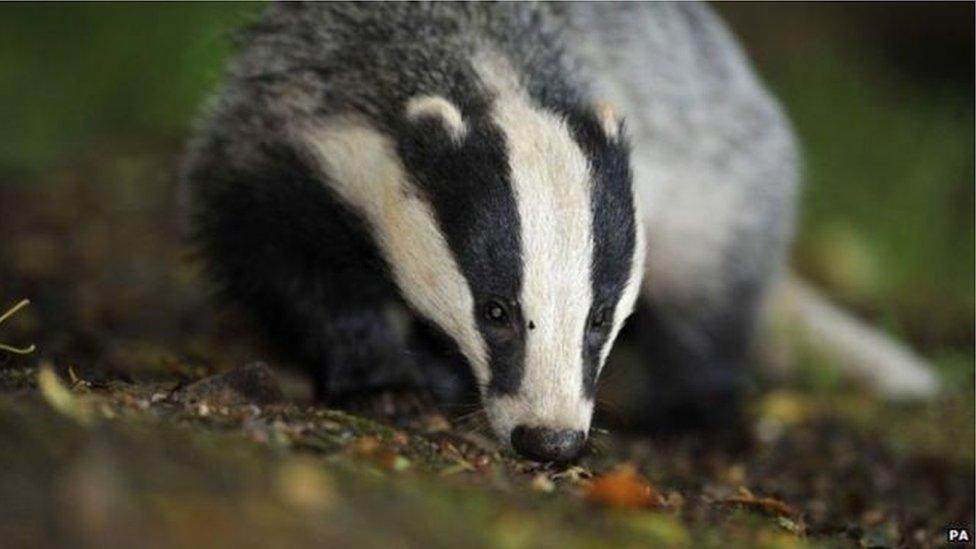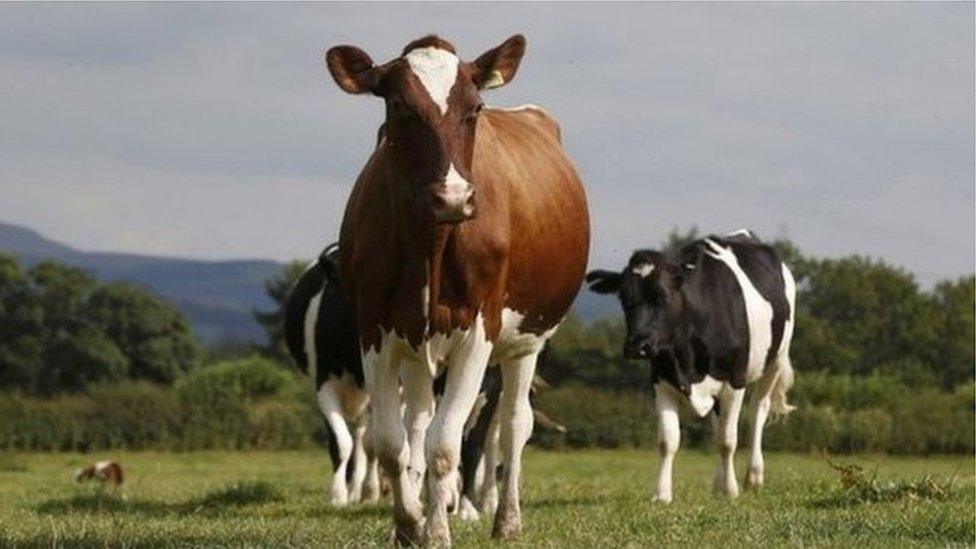Badger cull: Vets accuse ministers of 'barefaced lies'
- Published
- comments

A campaign group of vets has accused Defra and its ministers of telling "barefaced lies" about the effectiveness of one of its badger culls.
The claim is contained in a letter from the group to the chief vet.
It asks her to ensure the department retracts "insupportable claims that its badger cull policy is working".
A spokesman for Defra said all statements had been "absolutely correct".
Dr Iain McGill, a veterinary surgeon and director of Prion Interest Group, told BBC News that claims by Defra (the Department for Environment, Food and Rural Affairs) that the badger cull in Somerset and Gloucestershire were working were not supported by scientific evidence.
"According to Defra's figures, they claim that they calculated that the incidence [of TB in cattle] has reduced.
"But their calculations are unclear and deliberately opaque. And, indeed, the current situation in the cull zone says there is an increased prevalence.
"So, either their figures were calculated on an extremely inaccurate basis and they've got it very badly wrong, or they have actually gerrymandered those figures to make it look as if the incidence is falling when the evidence clearly shows that the prevalence has gone up.
"Badger culling has not worked. They are issuing barefaced lies in this matter."
The letter to chief vet Dr Christine Middlemiss goes on to accuse Farming Minister George Eustice of giving misleading comments in September about a report produced by Defra's own scientists at the Animal and Plant Health Agency (APHA).
Mr Eustice had said: "Today's figures showing reductions in TB cases in Somerset and Gloucestershire, external are evidence that our strategy for dealing with this slow-moving, insidious disease is delivering results."
However, the APHA report he quotes from explicitly states, "these data alone cannot demonstrate whether the badger control policy is effective in reducing bovine TB in cattle".
Weight of science
The science behind the badger cull was established in 1990s
On 29 October, Defra went further in a statement to BBC Radio 4's Farming Today programme when it indicated that the alleged reduction in TB cases was due to the badger culls: "The findings published in September showed that initial [badger] culls in the Higher Risk Area (HRA) have had a positive impact on disease incidence."
The department has not mentioned that instances of TB have been rising in a cull area in Dorset.
Dr Chris Cheeseman is former head of Defra's wildlife epidemiology unit and advised the department on its TB strategy for more than 40 years. Now retired, he is able to speak freely about the badger cull policy.
"Defra has been cherry-picking the science since they started culling," he told BBC News. "The fact that they are rolling it out on such a vast scale is a travesty of the available science."
In response, a Defra statement said: "The latest statistics showed reductions in new outbreaks of bovine TB in the initial cull areas, an encouraging sign that the steps we have taken have had a positive impact.
"Based on this scientific data, Minister Eustice was absolutely correct to describe this progress as encouraging."
Environment Secretary Michael Gove commissioned an independent expert review earlier this year of Defra's efforts to control cattle TB - which will be published tomorrow.

Cattle herds are checked for the presence of TB with a skin test
Dr McGill's group has also raised concerns that new research adds to evidence that a skin test widely used by the department to detect the presence of TB in cattle is much less effective than claimed.
On Defra's TB Hub, it is stated that effectiveness "lies between 52% and 100%, external with an average of about 80% sensitivity at standard interpretation".
But two new research papers indicate that the average effectiveness may be much lower, between 50% and 60% at best.
Jan Bayley of the Animal Welfare Group, which is campaigning against the cull in Gloucestershire, says that Defra is missing many cases of TB in cattle with these tests.
She said: "Farmers are being told that their herds are TB-free. They then go down with disease three or six months later and they automatically assume it's got to be badgers.
"Defra is really not explaining to farmers that there is a high probability that those herds are still infected."
Defra conceded in a paragraph of a consultation paper published in 2016, external - but not widely publicised - that most new TB cases in high-risk areas were probably due to infected cattle: "This substantial probability of 'residual' herd infection contributes to the high rate of recurrence seen in the high-risk areas, where nearly 60% of TB breakdowns (TB cases) occur in herds."
Media access
Much of the new work on the effectiveness of the skin test was conducted by Defra's own scientists at APHA in Surrey.
Defra declined a request by BBC News to speak directly to the researchers involved, although the department's press officers did offer to mediate written questions.
A spokesperson explained that it was against the civil service code for civil servants to speak to journalists without the permission of ministers. This includes instances where the research is publicly funded and published in peer-reviewed journals.
Former Defra scientist Dr Chris Cheeseman said he regarded this as a misuse in the application of the civil service code: "When I was a scientist working for governments, I always maintained the principle that I stuck to the truth.
"I think it's outrageous that the government should gag in any way scientists who work for them, either independently or directly. I think that's completely unacceptable in a democracy."
Defra responded: "Any requests to interview civil servants are handled in line with the civil service code, external. This states that civil servants must not make any public statement which might draw upon experience in their official capacity without the prior approval of their department.
"As a starting point, the views of the civil servant as to whether they would consider accepting the request would be taken into account."